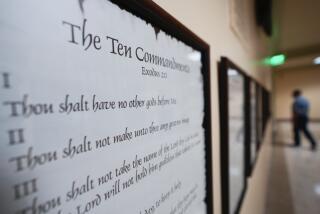‘Covenant Marriage’ Movement Making Little Headway in U.S.
- Share via
NEW YORK — Across America, it is easy to find politicians and civic leaders decrying the prevalence and social cost of divorce. It is far harder to find consensus about what, if anything, policymakers should do in response.
An array of proposals has reached legislative hearing rooms; few of substance have been enacted.
No state has followed Florida’s example in requiring a marriage-education curriculum for public high school students. Only one state, Arizona, has joined pioneering Louisiana in approving covenant marriages, in which couples voluntarily impose limits on their ability to divorce.
Despite the setbacks, including rebuffs of covenant-marriage bills in more than 20 legislatures, supporters of the so-called Marriage Movement are encouraged.
“At least marriage is back on the agenda,” said Alan Hawkins, a professor of family sciences at Brigham Young University. “I find that amazing.”
Hawkins supports covenant marriage and several other proposals created to discourage divorce, but he is not surprised at the wary reaction of many legislators.
“We’re treading on very sensitive ground,” he said. “We’re just surfacing from a generation of living in a culture of divorce and questioning whether it was everything we hoped it would be. It’s a bigger step from questioning, and realizing there are real problems, to saying we ought to do something about the problems.”
Few Choose the Option
The backers of Louisiana’s covenant-marriage law hoped they were sending a message to the rest of the country when they pushed their bill through to passage in 1997. It was touted as the first substantive move in two centuries to make divorce harder rather than easier.
In essence, covenant marriage gives couples the option of spurning no-fault divorce; they sign binding contracts that require premarital counseling and permit divorce only in cases of abuse, abandonment, adultery, imprisonment of a spouse or a lengthy separation.
So far, however, fewer than 5% of Louisiana couples are choosing covenant marriage. And Arizona, the only other state to try covenant marriage, opted for a weaker law that allows participating couples to divorce relatively easily if there is mutual consent.
Tony Perkins, the state representative who sponsored Louisiana’s law, admits the response of other states has been discouraging. He said the proposal had failed in some seemingly sympathetic legislatures--Texas and Oklahoma, for example--because of opposition by key committee chairmen who were divorce lawyers.
If covenant marriage were to spread, Perkins said, “It would be a blow to the divorce industry.”
Perkins predicted at least a few other states eventually would try covenant marriage, and he credited his bill with fueling a national discussion of marriage and divorce.
The Rev. Russ Stevenson, minister at the First Presbyterian Church in Baton Rouge, La., says religious leaders in Louisiana could be much more active in promoting covenant marriages.
At his church, Stevenson said, couples planning to wed were at first simply advised that covenant marriage was an option.
“They would look at each other with stars in their eyes and say, ‘Honey, we don’t really need that, do we?’ ” Stevenson said. “When you are in the full flush of love, preparing to get married, you are not thinking about divorce.”
Now Stevenson takes a firmer stance.
“We really ask couples to have a covenant marriage, and if they object, we try to talk them into it,” he said. “We think it’s in their best interest.”
Mike Johnson, a Baton Rouge lawyer, and his wife, Kelly, entered a covenant marriage in 1999. He has been trying since then to encourage friends to follow suit.
“In my generation, all we’ve ever known is the no-fault scheme, and any deviation from that seems like a radical move,” said Johnson, 28. “We’ve all been jaded by our parents’ divorces.
“Because so few people have chosen covenant marriage in Louisiana, it seems like an unpopular idea,” he said. “It’s not unpopular--it’s just unknown. Once the message is out there, a whole lot more people will choose it.”
Joe Cook, director of the Louisiana branch of the American Civil Liberties Union, disagrees.
“It’s a bad idea whose time should have never come,” he said. “Fortunately, it looks like it won’t catch on.”
The ACLU has criticized the law for seeming to infringe on the separation of church and state. Many of the movement’s staunchest backers are Christian conservatives, and the law offers a prominent role to clergy in premarital counseling.
The ACLU also is concerned that women who enter covenant marriages might have difficulty escaping from abusive relationships, even though the law specifies that domestic violence is among the grounds for breaking the covenant.
“They’re trying to come up with a quick fix to a complex problem,” Cook said. “If they want to help families, they can offer substance-abuse treatment, improve public education, ensure a living wage. . . . You just can’t legislate a good marriage.”
Different tactics to curb divorce have been tried in other states, often unsuccessfully. In Minnesota, Gov. Jesse Ventura vetoed a bill last year that would have lowered marriage license fees for couples who seek counseling before tying the knot.
“I do not believe that government has a role in marriage counseling,” Ventura said.
In Wisconsin, a federal judge last year struck down a new state law that earmarked $210,000 in welfare money to help members of the clergy encourage mentoring of younger couples by long-married couples. The judge said the law unconstitutionally favored ministers over laypeople such as judges or justices of the peace.
In Florida, lawmakers did reach consensus in 1998 on a first-of-its-kind bill that promotes premarital counseling and requires relationship skills to be taught in high school.
Former state Rep. Elaine Bloom of Miami, who sponsored the bill, believes other states will take similar steps. But she said any curriculum on the topic is likely to be attacked from both the left and right as a government intrusion into family matters.
“Any effort like that here would probably meet with heavy resistance,” said Kelly Shackelford, president of the Free Market Foundation, a major conservative lobbying group in Texas. “There’s a pretty strong ‘stay out of my family’ attitude.”
Bloom said she persevered because of the heartbreak that can accompany family breakups.
“The most poignant statements I heard were from fathers who said, ‘If I had known before I started the divorce process how difficult it would be to see my kids, I would have made a better attempt to be a good husband and father.’ ”
U.S. divorce rates soared in the 1970s after no-fault divorce laws spread nationwide, then stabilized. There are no current official national figures, but experts estimate that more than 40% of recent marriages will end in divorce.
‘Consumer Marriage’ Decried
Oklahoma has been the most aggressive state in combating divorce, pursuing a multi-pronged $10-million initiative under the leadership of Gov. Frank Keating. He wants to cut the state’s divorce rate--one of the nation’s highest--by a third within a decade.
In December, more than 200 Oklahoma religious leaders agreed that they would request engaged couples in their institutions to go through a four- to six-month marital-preparation period.
The Legislature passed some of Keating’s other marriage proposals, but balked at covenant marriage and a recommendation to remove mutual incompatibility as a ground for divorce.
William Doherty, a University of Minnesota professor who decries the advent of “consumer marriage,” testified in support of a covenant-marriage bill that died in a legislative committee last year. He was struck by the vehement opposition.
“There was a concern that getting into a covenant marriage could curtail the options to get out quickly,” Doherty said. “When anything seems to threaten adult autonomy and choice, you get people coming out of the woodwork to oppose it.”
Doherty said he wouldn’t push the issue again in Minnesota until there are thorough studies of the impact of Louisiana’s covenant-marriage law.
One such study is being conducted by Steven Nock, a University of Virginia sociology professor. Though much work remains, Nock is convinced the Louisiana law can salvage some marriages by putting the brakes on divorce and allowing more time for reconciliation.
Nock says state officials nationwide increasingly view divorce as a legitimate matter of public concern because of the social costs arising from family breakups.
“You look at all the ideas that are being discussed--none of them individually is terribly powerful,” Nock said. “But for the first time in my life, Americans seem to be talking about marriage, writing articles about it. . . . There have been countless conversations at dinner tables, in pulpits, at work, about what is marriage.
“That’s a huge sea change,” he said. “Twenty years ago we weren’t talking about it at all.”
*
Covenant marriage information: https://www.divorcereform.org/cov.html
More to Read
Sign up for Essential California
The most important California stories and recommendations in your inbox every morning.
You may occasionally receive promotional content from the Los Angeles Times.













